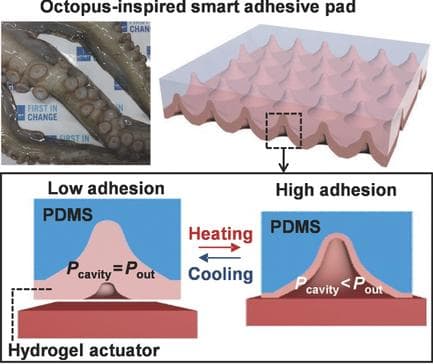Smart Adhesive Pads Like Octopus Suction Cups To Change The Sensor Accuracy
Inspired by nature, the world of science has put a greater emphasis on the mysterious bio-adhesive phenomenon experienced in zoological and biological species that might deliver impactful instruments for the benefit of human kind. Not only as a green non-toxic and adaptable material constituent, the bio-adhesive material can be used to develop aesthetics. As of now, it is relatively a newer topic featuring some specific areas that require attention and tuning.
A group of Korean material scientists from KAIST and UNIST has envisioned a bio-adhesive material structure designed in accordance with the peculiar suction cups of Octopuses. The ultimate product came out as a flexible pressure sensor capable of replacing inaccuracy compared to a standard scale. The research team implied, depending on the developed product, futuristic touch technology could be built however it requires a lot of effort as micro-nano ribbons were transferred from inorganic semiconductor and were embedded upon the polymer sheet.

A viable solution to the aforementioned method was then proposed by Prof. Hyunhyub Ko which greatly depends on the working principle of octopus suction cups. Octopuses generally move their tentacles to fulfil its locomotion. As per requirement, they place their cavity guarding suction cups made tentacles over well-built structures and momentarily sticks to them by controlling the pressure. The cups could be made thinner or thicker depending on the need.
Similarly, the research team has devised the octopus-inspired smart adhesive pads which thoroughly reproduce the way muscle actuated suction cups work. As the core, the team preferred to use polydimethylsiloxane (PDMS) – a rubbery material to bear pores coated with thermally sensitive material. The team revealed that to mimic the pressure control system, heat came handy. Reportedly, the outside wall stays at open position while it is placed in room temperature. As the temperature goes up above 32 degree centigrade, the walls contract creating suction and therefore it allows the pads to stick to the adjacent material. The complete research report was published in Advanced Materials.
Source: #-Link-Snipped-#
A group of Korean material scientists from KAIST and UNIST has envisioned a bio-adhesive material structure designed in accordance with the peculiar suction cups of Octopuses. The ultimate product came out as a flexible pressure sensor capable of replacing inaccuracy compared to a standard scale. The research team implied, depending on the developed product, futuristic touch technology could be built however it requires a lot of effort as micro-nano ribbons were transferred from inorganic semiconductor and were embedded upon the polymer sheet.

A viable solution to the aforementioned method was then proposed by Prof. Hyunhyub Ko which greatly depends on the working principle of octopus suction cups. Octopuses generally move their tentacles to fulfil its locomotion. As per requirement, they place their cavity guarding suction cups made tentacles over well-built structures and momentarily sticks to them by controlling the pressure. The cups could be made thinner or thicker depending on the need.
Similarly, the research team has devised the octopus-inspired smart adhesive pads which thoroughly reproduce the way muscle actuated suction cups work. As the core, the team preferred to use polydimethylsiloxane (PDMS) – a rubbery material to bear pores coated with thermally sensitive material. The team revealed that to mimic the pressure control system, heat came handy. Reportedly, the outside wall stays at open position while it is placed in room temperature. As the temperature goes up above 32 degree centigrade, the walls contract creating suction and therefore it allows the pads to stick to the adjacent material. The complete research report was published in Advanced Materials.
Source: #-Link-Snipped-#
0

